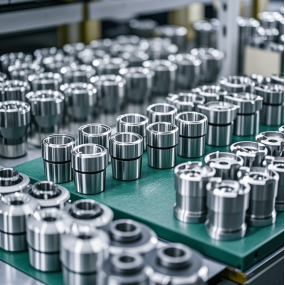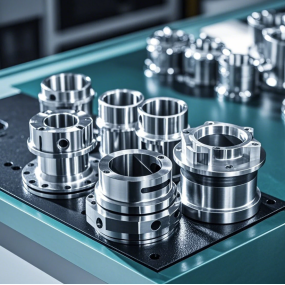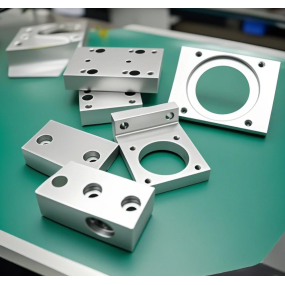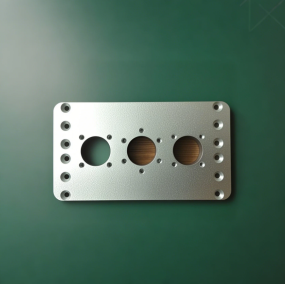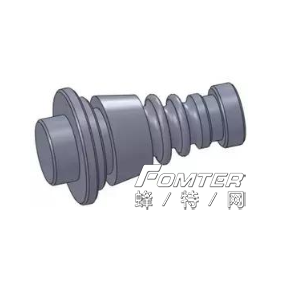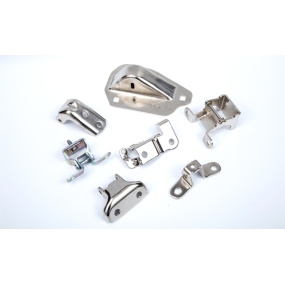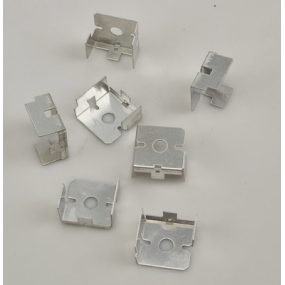CNC titanium alloy parts refer to parts made of titanium alloy by CNC technology. Titanium alloy is an alloy composed of titanium elements and other elements. Common alloying elements include aluminum, vanadium, molybdenum, zirconium, etc. The addition of these alloying elements can change the properties of titanium, such as improving strength, improving corrosion resistance, etc. Through CNC Machining, titanium alloy raw materials can be processed into mechanical parts with specific shape, dimensional accuracy and surface quality requirements. Next, the editor explains that CNC titanium alloy parts have the following characteristics and advantages: 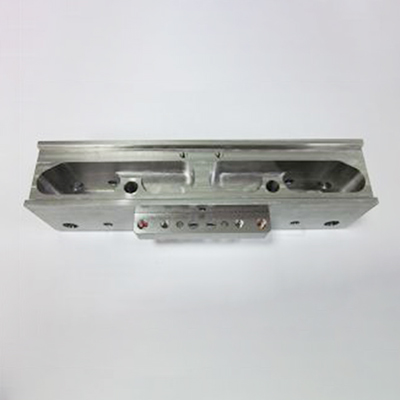 High strength and low density: The specific strength of titanium alloys is high, that is, the ratio of strength to density is large. This means that under the same weight, titanium alloy parts have higher strength than parts made of many other metal materials and can withstand greater loads. Therefore, they are widely used in aerospace, military and other fields with strict weight restrictions, such as aircraft structural parts, engine parts, etc., which can effectively reduce the weight of equipment, improve fuel efficiency and equipment mobility while ensuring structural strength. Excellent corrosion resistance: Titanium alloys have excellent corrosion resistance in a variety of harsh environments and can resist the erosion of seawater, acids, alkalis and other media. For example, in marine engineering, chemical equipment and other fields, titanium alloy CNC parts can work stably for a long time, reducing equipment damage and maintenance costs caused by corrosion and prolonging the service life of equipment. Good heat resistance: Titanium alloy can maintain good mechanical properties at higher temperatures, its melting point is as high as 1668 C, which can meet the requirements of high temperature environment to a certain extent, and is suitable for high temperature working scenarios such as aircraft engines and high temperature stoves. Good biocompatibility: Some titanium alloys have good biocompatibility and will not cause adverse reactions when in contact with human tissues and body fluids, so they are widely used in the medical field, such as the manufacture of artificial joints, dental implants, medical apparatus, etc., can play a role in the complex physiological environment of the human body for a long time and stably. Low modulus of elasticity: Titanium alloy has a relatively low modulus of elasticity, about 1/2 that of steel, which makes it more prone to elastic deformation when subjected to external forces. It has advantages in some situations that require shock absorption, buffering, or high adaptability to part deformation, such as the manufacture of support components for certain precision instruments. High machining accuracy: Through CNC machining technology, high-precision machining of titanium alloy parts can be achieved, and the size, shape, and surface quality of parts can be precisely controlled to meet the manufacturing needs of various complex shapes and high-precision requirements, ensuring the assembly accuracy and performance reliability of parts. Customizable: CNC machining can quickly and flexibly manufacture titanium alloy parts of various shapes, sizes and structures according to different design drawings and customer needs, meeting personalized and diverse production requirements, suitable for small batch, multi-variety production mode, able to provide customized solutions for different industries and fields. Good weldability: Titanium alloys have good welding performance and can be joined by a variety of welding methods, which can meet the manufacturing needs of complex structural parts and ensure the integrity and structural strength of parts.
High strength and low density: The specific strength of titanium alloys is high, that is, the ratio of strength to density is large. This means that under the same weight, titanium alloy parts have higher strength than parts made of many other metal materials and can withstand greater loads. Therefore, they are widely used in aerospace, military and other fields with strict weight restrictions, such as aircraft structural parts, engine parts, etc., which can effectively reduce the weight of equipment, improve fuel efficiency and equipment mobility while ensuring structural strength. Excellent corrosion resistance: Titanium alloys have excellent corrosion resistance in a variety of harsh environments and can resist the erosion of seawater, acids, alkalis and other media. For example, in marine engineering, chemical equipment and other fields, titanium alloy CNC parts can work stably for a long time, reducing equipment damage and maintenance costs caused by corrosion and prolonging the service life of equipment. Good heat resistance: Titanium alloy can maintain good mechanical properties at higher temperatures, its melting point is as high as 1668 C, which can meet the requirements of high temperature environment to a certain extent, and is suitable for high temperature working scenarios such as aircraft engines and high temperature stoves. Good biocompatibility: Some titanium alloys have good biocompatibility and will not cause adverse reactions when in contact with human tissues and body fluids, so they are widely used in the medical field, such as the manufacture of artificial joints, dental implants, medical apparatus, etc., can play a role in the complex physiological environment of the human body for a long time and stably. Low modulus of elasticity: Titanium alloy has a relatively low modulus of elasticity, about 1/2 that of steel, which makes it more prone to elastic deformation when subjected to external forces. It has advantages in some situations that require shock absorption, buffering, or high adaptability to part deformation, such as the manufacture of support components for certain precision instruments. High machining accuracy: Through CNC machining technology, high-precision machining of titanium alloy parts can be achieved, and the size, shape, and surface quality of parts can be precisely controlled to meet the manufacturing needs of various complex shapes and high-precision requirements, ensuring the assembly accuracy and performance reliability of parts. Customizable: CNC machining can quickly and flexibly manufacture titanium alloy parts of various shapes, sizes and structures according to different design drawings and customer needs, meeting personalized and diverse production requirements, suitable for small batch, multi-variety production mode, able to provide customized solutions for different industries and fields. Good weldability: Titanium alloys have good welding performance and can be joined by a variety of welding methods, which can meet the manufacturing needs of complex structural parts and ensure the integrity and structural strength of parts.
Hello! Welcome to EMAR's website!
 English
English » »
» »
 Spanish
Spanish Arabic
Arabic French
French Portuguese
Portuguese Belarusian
Belarusian Japanese
Japanese Russian
Russian Malay
Malay Icelandic
Icelandic Bulgarian
Bulgarian Azerbaijani
Azerbaijani Estonian
Estonian Irish
Irish Polish
Polish Persian
Persian Boolean
Boolean Danish
Danish German
German Filipino
Filipino Finnish
Finnish Korean
Korean Dutch
Dutch Galician
Galician Catalan
Catalan Czech
Czech Croatian
Croatian Latin
Latin Latvian
Latvian Romanian
Romanian Maltese
Maltese Macedonian
Macedonian Norwegian
Norwegian Swedish
Swedish Serbian
Serbian Slovak
Slovak Slovenian
Slovenian Swahili
Swahili Thai
Thai Turkish
Turkish Welsh
Welsh Urdu
Urdu Ukrainian
Ukrainian Greek
Greek Hungarian
Hungarian Italian
Italian Yiddish
Yiddish Indonesian
Indonesian Vietnamese
Vietnamese Haitian Creole
Haitian Creole Spanish Basque
Spanish Basque


